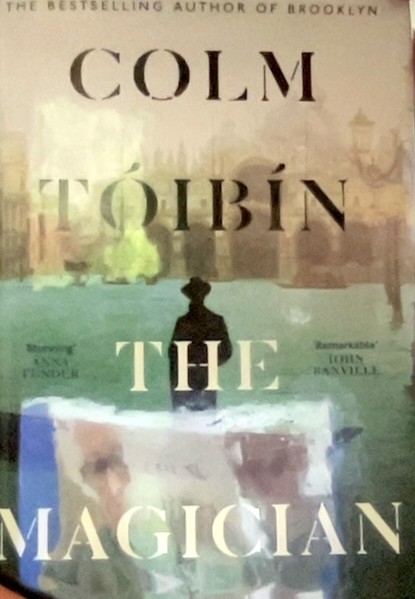Inspiring Older Readers
 posted on 22 Oct 2023
posted on 22 Oct 2023
The Magician by Colm Tóibín
It has been many years since I last read Thomas Mann’s Buddenbrooks or The Magic Mountain, but I regard both of these as formative reading experiences – the first, an essentially nineteenth century family saga, overflowing with life; the second, a towering (quite literally, with its unforgettable mountain sanatorium setting) twentieth-century novel of ideas.
Colm Tóibín’s novel about Thomas Mann and his family, The Magician, was published in 2021 to universal acclaim. It is long, intense and as is fitting for a writer like Mann, intellectually complex and grand in its ambitions.
This isn’t the first time that Tóibín has used this sort of fictionalised biography form: he first did it twenty years ago with the similarly ambitious The Master, about Henry James. Tóibín is fascinated by the act of creation – obviously, one might say, as he knows it from the inside through a lifetime of his own writing; but he is also fascinated by the creative process of other writers. In addition, I think these two writers in particular fascinate him because of the profoundly closeted gay lives they led in the repressed and repressive societies of their time.
Thomas Mann was born into a wealthy upper-middle class mercantile family – his father was a pillar of north German society, a senator and a highly successful grain merchant. On his father’s death the company was dissolved and the family’s fortunes went into steep decline. (This broadly speaking is the subject of Buddenbrooks.)
What Tóibín tries to do in this novel is penetrate behind the forbidding facade that Mann presented to the world – that of the Nobel laureate, an eminent public intellectual of great rectitude and influence – and consider the collision of public and private events, the trauma and loss, through which he and his complex extended family lived. These events include the cataclysm of the First World War, the 1918 revolution in Germany, the rise and fall of Nazism and the fate of the Jews, the Manns’ loss of their family wealth and prestige, and their life as emigrés, first in the US and finally after the war in Zurich. In addition, almost as a descant to these main themes, is Mann’s personal struggle with homosexual desire.
It is almost impossible to do this book justice in six hundred words but I hope this whirlwind description gives some sense of its scale and ambition.
I read it convinced that I was in the presence of greatness but not necessarily of enjoyment. While there can be absolutely no doubt that The Magician is a mighty achievement, I felt that despite Tóibín’s astonishing virtuosity there were times when the book seemed to be sagging under its own immense weight, its forward narrative sometimes overwhelmed with what one critic has termed ‘biographical reportage’. However, it does build, slowly and inexorably, and the final hundred pages or so are extraordinarily intense, with Hitler’s suicide, Germany’s surrender and the collapse of the Reich played out against the reuniting of a shattered Mann family, with Thomas Mann beginning to work out how his latest novel, Doctor Faustus, will synthesise the darkest urges of creativity and destruction. One senses not only Mann’s complex philosophical vision but also Tóibín’s fluency and confidence with this vision.
I knew something of the turbulent Mann family but even so I struggled to keep a clear grasp of who was who in this sprawling dynasty. What I knew much less of – and which the book covers extremely well – is Mann’s public life in the US during the war, and how he was courted as a ‘useful intellectual’ by various intermediaries on behalf of the president.
While I’m glad I made the effort to read The Magician I struggled to finish it and it isn’t a book I’m very likely to return to. This view, however, is a distinctly minority one: take a quick look at the reviews usefully gathered together on the Literary Hub website. I don’t think there is a single one that isn’t laudatory.
Alun Severn
October 2023